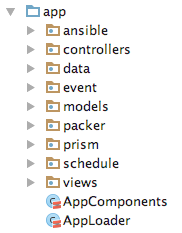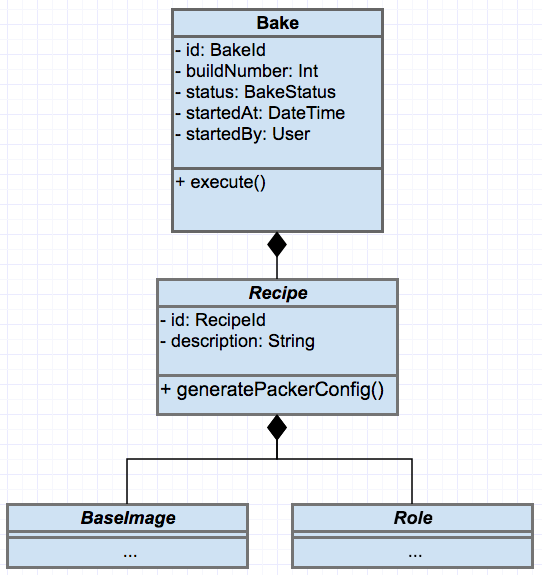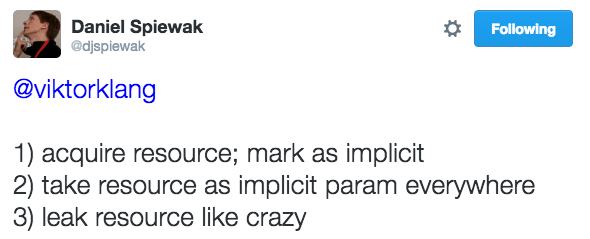Real-world
functional Scala

Chris Birchall
1st Oct 2016

OOP
time


Java dev
"better Java"
discover
Scala
rediscover
FP
Case study: AMIgo
-
Self-serve AMI bakery
-
Implemented in Scala + Play
-
Very impure/effect-heavy domain
-
File I/O, external processes, DynamoDB, ...
-
-
Event bus
-
Not many tests
DEMO
Package structure

Ansible stuff
Play controllers
DynamoDB DAOs
Event bus stuff
Domain models
Packer stuff
Guardian-specific stuff
Scheduler stuff
Play view templates
Play DI stuff
What went well?
Case study: AMIgo
What could be improved?
What AMIgo got right
-
Functional modelling
-
Prefer objects to classes
-
Avoid traits
-
No lazy vals
-
Minimise boilerplate
Functional modelling
Preamble
OOP design

Data
Behaviour
trait Recipe {
def generatePackerConfig(): File
}
trait ProcessRunner {
def run(cmd: Seq[String]): Future[Int]
}
class BakeImpl(
id: BakeId,
buildNumber: Int,
recipe: Recipe,
processRunner: ProcessRunner) extends Bake {
def execute(): Future[Int] = {
val packerFile =
recipe.generatePackerConfig()
val packerCommand =
buildPackerCommand(packerFile, buildNumber)
processRunner.run(packerCommand)
}
...
}Data
Behaviour
Decouple data from behaviour
FP design
Model your domain using
Algebraic Data Types (ADTs)
Data
Sum type
- A or B or ...
- Represented in Scala using sealed trait/abstract class
sealed abstract class BakeStatus
case object Running extends BakeStatus
case object Complete extends BakeStatus
case object Failed extends BakeStatus
Product type
- A and B and ...
- Represented in Scala using case class
case class Bake(
recipe: Recipe,
buildNumber: Int,
status: BakeStatus,
amiId: Option[AmiId],
startedBy: String,
startedAt: DateTime
)Use the type system to your advantage
Data
case class AmiId(value: String) extends AnyVal
case class BaseImageId(value: String) extends AnyVal
case class RecipeId(value: String) extends AnyVal
case class RoleId(value: String) extends AnyVal
case class BakeId(recipeId: RecipeId, buildNumber: Int)
Value class: no runtime overhead
Use the type system to your advantage
Data
object Bakes {
def updateAmiId(bakeId: BakeId, amiId: AmiId): Unit = ...
}val bakeId = BakeId(RecipeId("my-recipe"), buildNumber = 123)
val amiId = AmiId("ami-a1b2c3d4")
Bakes.updateAmiId(amiId, bakeId) // yay, compile error!Model your errors
Data
def loadRoleFromDisk(roleId: RoleId): Role = {
...
if (dirNotFound)
throw new IOException("Role directory not found")
...
if (invalid)
throw new InvalidRoleException("check ur role!")
...
}def loadRoleFromDisk(roleId: RoleId):
Either[IOException,
Either[InvalidRoleException,
Role]] = ...Nope!
Hmm...
Model your errors
Data
sealed trait LoadRoleResult
object LoadRoleResult {
case class Success(role: Role) extends LoadRoleResult
case object RoleDirectoryNotFound extends LoadRoleResult
case object RoleFormatInvalid extends LoadRoleResult
}
def loadRoleFromDisk(roleId: RoleId): LoadRoleResult = ...Downside: don't get map/flatMap for free
Model your errors
Data
sealed trait LoadRoleError
object LoadRoleError {
case object RoleDirectoryNotFound extends LoadRoleError
case object RoleFormatInvalid extends LoadRoleError
}
def loadRoleFromDisk(roleId: RoleId): Either[LoadRoleError, Role] = ...Keep an eye out for monoids
Data
TODO
This gives you a bunch of stuff for free
e.g. foldMap
case class Result(successes: Int, failures: Int)
implicit val rm = new Monoid[Result] {
def empty = Result(0, 0)
def combine(x: Result, y: Result) = Result(
successes = x.successes + y.successes,
failures = x.failures + y.failures
)
}Keep an eye out for monoids
Data
TODO
Maps the function over the list and combines the results
def processPageOfItems(page: Page[Item]): Result = ...
val pages: List[Page] = ...
import cats.instances.list._
import cats.syntax.foldable._
val overallResult: Result =
pages.foldMap(processPageOfItems)Behaviour
Data
- ADTs
- Strongly typed
- Model all the things
Model behaviour as plain old functions
Behaviour
object PlaybookGenerator {
def renderRole(role: CustomisedRole): String = ...
def generatePlaybook(recipe: Recipe): Yaml = {
val allRoles = recipe.baseImage.builtinRoles ++ recipe.roles
val roleStrings = allRoles.map(renderRole)
Yaml(...)
}
...
}Larger functions composed of smaller ones
Behaviour
Function hierarchy
Data
- ADTs
- Strongly typed
- Model all the things
Some functions are purer than others
Behaviour
object PackerRunner {
def createImage(bake: Bake): Future[ExitCode] = {
val playbookYaml =
PlaybookGenerator.generatePlaybook(bake.recipe)
val playbookFile = writeToTempFile(playbookYaml)
val packerBuildConfig = PackerBuildConfigGenerator
.generatePackerBuildConfig(bake)
val packerConfigFile = writeToTempFile(packerBuildConfig)
executePacker(bake, playbookFile, packerConfigFile)
}
...
}Pure 😇
Pure 😇
Impure 🙈
Impure 🙈
Impure 🙈
Behaviour
Pure
functions
Effects
Data
- ADTs
- Strongly typed
- Model all the things
What AMIgo got right
-
Functional modelling
-
Prefer objects to classes
-
Avoid traits
-
No lazy vals
-
Minimise boilerplate
Prefer objects to classes
vs
object PackerRunner {
def createImage(bake: Bake): Future[ExitCode] = {
...
}
}class PackerRunner(bake: Bake) {
def createImage(): Future[ExitCode] = {
...
}
}Prefer objects to classes
Benefits of objects
- Singleton
- No lifecycle to worry about
- Principle of least power
- No state, just a bunch of functions
Prefer objects to classes
Problem: You end up passing lots of params around
Partial solution: Pass them implicitly
If this gets excessive, bundle into a single context class
(c.f. ScalaCache)
object Recipes {
def list()(implicit dynamo: Dynamo): Iterable[Recipe] = {
...
}
...
}class RecipeController(...)(implicit dynamo: Dynamo)
extends Controller {
def listRecipes = Action {
Ok(views.html.recipes(Recipes.list()))
}
...
}Caveat: Daniel Spiewak calls this an anti-pattern

... but it's fine if resource lifecycle == app lifecycle
Prefer objects to classes
Problem: how to do Dependency Injection?
Supplementary question: why do we do DI?
Dependency injection
Why do we do DI?
- Mocking dependencies so we can test in isolation
- Separating business logic from resource management
OOP
FP
DAG of dependencies
Function composition
Dependency injection
1. Mocking dependencies
Pass functions as parameters
case class PackerInput(bake: Bake, playbookFile: Path, packerConfigFile: Path)
def createImage(bake: Bake,
createPlaybook: Recipe => Path,
createPackerConfig: Bake => Path,
runPacker: PackerInput => Future[ExitCode]): Future[ExitCode] = {
val playbookFile = createPlaybook(bake.recipe)
val packerConfigFile = createPackerConfig(bake)
runPacker(PackerInput(bake, playbookFile, packerConfigFile))
}Dependency injection
2. Resource management
Bad:
Better:
def getItem(id: Int): Option[Item] = {
val conn = new DBConnection()
try {
...
} finally {
conn.close()
}
}def getItem(id: Int,
conn: DBConnection): Option[Item] = {
...
}Dependency injection
2. Resource management
Even better:
def getItem(id: Int) = { (conn: DBConnection) =>
...
}val run: DBConnection => Item = getItem(123)
val item: Item = run(new DBConnection())Curried function
- Pure
- Separates description from execution
- Composable (we'll come back to this)

What AMIgo got right
-
Functional modelling
-
Prefer objects to classes
-
Avoid traits
-
No lazy vals
-
Minimise boilerplate
Avoid traits
Traits are attractive to OOP devs
- Multiple inheritance, diamond inheritance
- Mixin = exciting inheritance/composition hybrid
- Can be used like a Java/C# interface
- Support fancy patterns, e.g. abstract override
Avoid traits
Problems with traits
- Initialisation order gotchas
- "NullPointerException?! I thought Scala didn't have nulls!"
- Hack around with lazy vals (or, shudder, early init)
- Encourages inheritance, overriding, OOP design
Avoid traits
Corollary: no cake!

What AMIgo got right
-
Functional modelling
-
Prefer objects to classes
-
Avoid traits
-
No lazy vals
-
Minimise boilerplate
No lazy vals
- Runtime overhead
- Risk of deadlock
- Cognitive overhead
- Initialisation of lazy val ≈ side-effect
object HandyService {
lazy val usefulData = expensiveComputation()
}
object MyCode {
def performanceCriticalCode() = {
val foo = HandyService.usefulData
...
}
}Is this OK?
Has somebody already taken the performance hit for us?
What AMIgo got right
-
Functional modelling
-
Prefer objects to classes
-
Avoid traits
-
No lazy vals
-
Minimise boilerplate
Data
- ADTs
- Strongly typed
- Model all the things
Behaviour
Pure
functions
Effects
Minimise boilerplate
Glue, wiring, boilerplate
Minimise boilerplate
Scanamo
- One line to write arbitrary case class to DynamoDB
- Codec is automatically derived using shapeless
object Bakes {
def create(...)(implicit dynamo: Dynamo): Bake = {
val bake = Bake(...)
val dbModel = ...
Scanamo.put(dynamo.client)(tableName)(dbModel)
bake
}
...
}Minimise boilerplate
Automagic
Transforms between domain models and DB models
object Bake {
case class DbModel(
recipeId: RecipeId,
buildNumber: Int,
status: BakeStatus,
amiId: Option[AmiId],
startedBy: String,
startedAt: DateTime)
import automagic._
def domain2db(bake: Bake): DbModel =
transform[Bake, Bake.DbModel](bake, "recipeId" -> bake.recipe.id)
def db2domain(dbModel: DbModel, recipe: Recipe): Bake =
transform[Bake.DbModel, Bake](dbModel, "recipe" -> recipe)
}Minimise boilerplate
Enumeratum
Makes sealed classes work like enums
sealed abstract class BakeStatus extends EnumEntry
object BakeStatus extends Enum[BakeStatus] {
val values = findValues
case object Running extends BakeStatus
case object Complete extends BakeStatus
case object Failed extends BakeStatus
}val running: BakeStatus = BakeStatus.withName("Running")What could be improved
-
Separation of pure and impure code
- Try the Reader monad for DI
-
Separate description from execution
- Try the Free monad
Measures of success
-
More of the code can be tested
-
No loss of readability/understandability
- Who is the target audience?
Reader monad
Wraps a function f: A => B
scala> import cats.data.Reader
import cats.data.Reader
scala> val f: Int => String = _.toString
f: Int => String = <function1>
scala> val reader = Reader(f)
reader: cats.data.Reader[Int,String] = ...
scala> reader.run(123)
res1: cats.Id[String] = 123
umm... why?
Reader monad
Recap: DI via currying
def getItem(id: Int) = { (conn: DBConnection) =>
...
}val run: DBConnection => Item = getItem(123)
val item: Item = run(new DBConnection())Reader monad
Composition with currying
def getItem(id: Int): DBConnection => Item = {
(conn: DBConnection) =>
// read from DB
Item(id, "widget")
}
def renameItem(item: Item, newName: String): DBConnection => Item = {
(conn: DBConnection) =>
// save to DB
item.copy(name = newName)
}
def renameItemWithId(id: Int, newName: String): DBConnection => Item = {
(conn: DBConnection) =>
val item = getItem(id)(conn)
renameItem(item, newName)(conn)
}
val item: Item = renameItemWithId(123, "hello")(new DBConnection())Reader monad
Composition with Reader
import cats.data.Reader
def getItem(id: Int) = Reader[DBConnection, Item]{
conn =>
// read from DB
Item(id, "widget")
}
def renameItem(item: Item, newName: String) = Reader[DBConnection, Item]{
conn =>
// save to DB
item.copy(name = newName)
}
def renameItemWithId(id: Int, newName: String): Reader[DBConnection, Item] = {
for {
item <- getItem(id)
updatedItem <- renameItem(item, newName)
} yield updatedItem
}
val result: Item = renameItemWithId(123, "hello").run(new DBConnection())Reader monad
Slightly more realistic example
def getItem(id: Int): DBConnection => Option[Item] = {
(conn: DBConnection) =>
// read from DB
Some(Item(id, "widget"))
}
def renameItem(item: Item, newName: String): DBConnection => Item = {
(conn: DBConnection) =>
// save to DB
item.copy(name = newName)
}
def renameItemWithId(id: Int, newName: String): DBConnection => Option[Item] = {
(conn: DBConnection) =>
val item = getItem(id)(conn)
item.map(x => renameItem(x, newName)(conn))
}
val item: Option[Item] = renameItemWithId(123, "hello")(new DBConnection())Reader monad
Again with Reader
import cats.data.Reader
def getItem(id: Int) = ReaderT[Option, DBConnection, Item]{
conn =>
// read from DB
Some(Item(id, "widget"))
}
def renameItem(item: Item, newName: String) = Reader[DBConnection, Item]{
conn =>
// save to DB
item.copy(name = newName)
}
def renameItemWithId(id: Int, newName: String): ReaderT[Option, DBConnection, Item] = {
for {
item <- getItem(id)
updatedItem <- renameItem(item, newName).lift[Option]
} yield updatedItem
}
val result: Option[Item] = renameItemWithId(123, "hello").run(new DBConnection())Reader monad
How would this look in AMIgo?
def createImage(bake: Bake, prism: Prism, eventBus: EventBus)
(implicit packerConfig: PackerConfig): Future[ExitCode] = {
val playbookYaml = PlaybookGenerator.generatePlaybook(bake.recipe)
val playbookFile = TempFiles.writePlaybookToFile(playbookYaml, bake.recipe.id)
prism.findAllAWSAccountNumbers() flatMap { awsAccountNumbers =>
Logger.info(s"AMI will be shared with the following AWS accounts: $awsAccountNumbers")
val packerBuildConfig = PackerBuildConfigGenerator.generatePackerBuildConfig(
bake, playbookFile, awsAccountNumbers)
val packerConfigFile =
TempFiles.writePackerConfigToFile(packerBuildConfig, bake.recipe.id)
PackerRunner.executePacker(bake, playbookFile, packerConfigFile, eventBus)
}
}
Starting point
Reader monad
def createImage(
createPlaybook: Recipe => Path,
findAllAWSAccounts: WSClient => Future[Seq[AWSAccount]],
createPackerBuildConfig: (Bake, Path, Seq[AWSAccount], PackerConfig) => Path,
executePacker: (Bake, Path, Path, EventBus) => Future[ExitCode])
(bake: Bake,
eventBus: EventBus,
wSClient: WSClient,
packerConfig: PackerConfig): Future[ExitCode] = {
val playbookFile = createPlaybook(bake.recipe)
findAllAWSAccounts(wSClient) flatMap { awsAccounts =>
Logger.info(s"AMI will be shared with the following AWS accounts: $awsAccounts")
val packerConfigFile =
createPackerConfigToFile(bake, playbookFile, awsAccounts, packerConfig)
PackerRunner.executePacker(bake, playbookFile, packerConfigFile, eventBus)
}
}
Pass functions as arguments
Reader monad
// In AppComponents.scala
val createImage: (Bake, EventBus, WSClient, PackerConfig) = BuildService.createImage(
createPlaybook = PlaybookGenerator.generatePlaybook andThen TempFiles.writeToFile,
findAllAWSAccounts = ...,
...
) _Use currying to hide wiring
// In controller
val bake = Bakes.create(recipe, buildNumber, startedBy = request.user.fullName)
createImage(bake, eventBus, wsClient, packerConfig)Reader monad
class CreateImageContext(
eventBus: EventBus,
wSClient: WSClient,
packerConfig: PackerConfig
)
def createImage(
createPlaybook: Recipe => Path,
findAllAWSAccounts: WSClient => Future[Seq[AWSAccount]],
createPackerBuildConfig: (Bake, Path, Seq[AWSAccount], PackerConfig) => Path,
executePacker: (Bake, Path, Path, EventBus) => Future[ExitCode])
(bake: Bake)(context: CreateImageContext): Future[ExitCode] = {
...
}
Bundle dependencies into a context
Reader monad
def createImage(
createPlaybook: Recipe => Future[Path],
findAllAWSAccounts: ReaderT[Future, WSClient, Seq[AWSAccount]],
createPackerBuildConfig:
(Bake, Path, Seq[AWSAccount]) => ReaderT[Future, PackerConfig, Path],
executePacker: (Bake, Path, Path) => ReaderT[Future, EventBus, ExitCode])
(bake: Bake): ReaderT[Future, CreateImageContext, ExitCode] = {
...
}
Reader-ify
Any function that took one of the dependencies as an argument now returns a Reader (or ReaderT)
Reader monad
def createImage(
...
)
(bake: Bake): ReaderT[Future, CreateImageContext, ExitCode] = {
...
... wiring to turn all the params into ReaderT[Future, CreateImageContext, A]
...
for {
playbookFile <- writePlaybook(playbookYaml)
accounts <- findAccounts
_ = Logger.info(s"AMI will be shared with the following AWS accounts: $accounts")
packerConfigFile <- writePackerBuildConfig(bake, playbookFile, accounts)
exitCode <- runPacker(PackerInput(bake, playbookFile, packerConfigFile))
} yield {
exitCode
}
}
Compose the readers
Reader monad
type UseContext[A] = ReaderT[Future, CreateImageContext, A]
val writePlaybook: Recipe => UseContext[Path] = recipe =>
ReaderT.lift[Future, CreateImageContext, Path](createPlaybook(recipe))
val findAccounts: UseContext[Seq[AWSAccount]] =
findAllAWSAccountNumbers.local[CreateImageContext](_.wsClient)
val writePackerBuildConfig: (Bake, Path, Seq[AWSAccount]) => UseContext[Path] =
(bake, path, awsAccounts) =>
createPackerBuildConfig(bake, path, awsAccounts)
.local[CreateImageContext](_.packerConfig)
val runPacker: PackerInput => UseContext[ExitCode] = packerInput =>
executePacker(packerInput).local[CreateImageContext](_.eventBus)So, about that wiring...
Reader monad
Monad wrangling
What we want: ReaderT[F, Input, Output]
| What we have | Necessary wrangling |
|---|---|
| a: Output | ReaderT.pure[F, Input, Output](a) |
| fa: F[Output] | ReaderT.lift[F, Input, Output](fa) |
| r: Reader[Input, Output] | r.lift[F] |
| r: ReaderT[F, X, Output] | r.local[Input](_.x) |
Reader monad
val bake = ... // generate using scalacheck-shapeless!
val reader = BuildService.createImage(
createPlaybook = _ => Future.successful(Paths.get("playbook.yml")),
findAllAWSAccounts = ...
createPackerBuildConfig = ...
executePacker = _ => ReaderT.pure[Future, EventBus, ExitCode](ExitCode(0))
)(bake)
val future = reader.run(context)
whenReady(future){ exitCode => exitCode should be(ExitCode(0)) }I can now write a (quite cumbersome) test
Reader monad
Conclusions
- This was not a good use case for Reader
- Could have injected deps using plain old currying
- In the real world, lift/pure/local wiring is painful
- Start with Reader, don't add it retroactively
Reader monad
by the way...
ReaderT[F, A, B] == Kleisli[F, A, B]
Reader[A, B] == Kleisli[Id, A, B]
So now you know what Kleisli means!
Free monad
... will have to wait for another talk
Summary
- Model your domain functionally
- Minimise boilerplate
- Separate description from execution
- There's more than one way to do so
Learning resources
- ReaderT 101 - Mind Candy blog
- A purely functional approach to building large applications - Noel Markham
- Dead-Simple Dependency Injection - Rúnar Bjarnason
Reader monad
Learning resources
- Compositional Application Architecture With Reasonably Priced Monads - Rúnar Bjarnason
- Cats Free monad documentation
- Why The Free Monad Isn't Free - Kelley Robinson
Free monad
Learning resources
General FP/other
- Functional Programming Patterns v3 - Raúl Raja Martínez
- Functional and Reactive Domain Modelling - Debasish Ghosh
- Functional Programming in Scala - Paul Chiusano and Rúnar Bjarnason
Real world functional Scala
By Chris Birchall
Real world functional Scala
- 7,223



